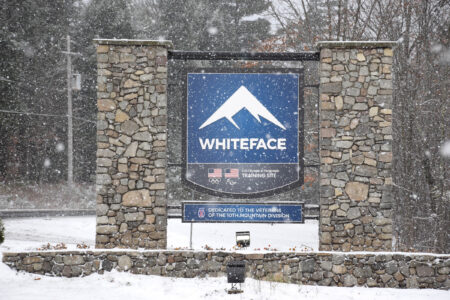NY-21 Democratic congressional candidates disagree on health care, shutdown
The Democratic candidates vying to get their party’s nod for New York’s 21st Congressional District have different takes on the ongoing federal government shutdown that appears to be nearing its end.
Democratic tactics during what has become the longest shutdown in U.S. history, and the fundamentals of the American health care system that sparked the shutdown in the first place, are at the core of their disagreements.
For more than 40 days now, the federal government has been shut down because the U.S. Senate has been unable to find 60 members willing to vote for one of two government funding bills. Republicans have refused to support a bill backed by Democrats that would fund the government and extend a series of tax credits targeted for people on Affordable Care Act marketplace health insurance plans, which since 2020 have made those plans much more affordable for middle and lower income families. Democrats have refused to support a bill backed by Republicans that would fund the government but would not extend those ACA credits.
Without the credits being extended, many people who rely on the marketplace plans to get their insurance will see the costs of their options rise dramatically. Some people have reported their premiums have increased by thousands of dollars per year, although for others the price of coverage has only increased slightly or not at all. The specifics of a person’s premium costs are dictated by a complex formula, but for a large portion of the 24 million Americans who have marketplace plans, a large part of their costs are covered by a tax credit that was increased dramatically by Congress in 2020, in the midst of the COVID-19 pandemic. That credit expires at the end of this year.
The U.S. House, dominated by Republicans and without the filibuster — the upper chamber’s rule that requires a supermajority of the chamber to back controversial legislation for it to pass — handed the Senate a version of a government funding bill that would not extend those credits. Since then, the House has been on indefinite leave, with most lawmakers not in D.C. and no votes scheduled.
Marketplace insurance plans have to be chosen and locked in before the end of the year.
In a conference call with local media on Monday, NY-21 Democratic candidate Blake Gendebien said he believes neither party has behaved responsibly in this situation. Citing his 100-plus in-person campaign events across the district in the last 11 months, Gendebien said the average North Country resident believes that Congress is fundamentally broken.
“Democrats aren’t doing a good job, Republicans aren’t doing a good job,” he said. “Government shutdowns are a bad thing, and since 2013 they’ve been used to leverage one problem for another, and when you’re a hard working person in the North Country, all you feel is like a political hot potato.”
He pointed to the scores of North Country residents missing out on their paychecks; TSA agents and air traffic controllers at regional airports, civilian staff and now military service members on Fort Drum and at the Naval Support Activity in Saratoga Springs, security and customs agents along the northern border, as well as the thousands of regional residents who rely on food assistance benefits that have been delayed.
Gendebien would rather see the government funded than continue to hold out on policy priorities from the minority party.
“I do not think government shutdowns are a healthy way to negotiate policy,” he said. “Let’s go to the ballot box next November, and lets make change at the ballot box.”
But Dylan Hewitt, another candidate running to get the Democratic Party’s nomination to represent NY-21, sees it differently. Hewitt said he believes that the deal moving through the Senate is a mistake.
“It’s an abandonment of the thousands of NY-21 families who will see their health care costs double, and the millions of Americans who will face rising costs and in many cases, lose the care they deserve,” Hewitt said in an interview Monday afternoon.
Hewitt pointed to the simultaneous changes coming to Medicaid by the Trump administration, expected to push thousands of people off of the government-subsidized health plan for people who earn very little to no money. That’s expected to jeopardize the finances of rural hospitals across NY-21, which treat many Medicaid and Medicare patients. He said there’s just too much at stake for Democrats in Washington to be willing to cave on their demands to preserve these programs.
At the start of the shutdown, Democrats were demanding that any government funding package reverse the Medicaid cuts as well as extend the ACA tax credits. That demand has dropped away, and now even as Democratic Party leadership denounce the deal, it appears it will pass the Senate.
Ultimately, Hewitt puts the blame on the Republican Party for the shutdown, the steep increase in the cost of basic necessities like health insurance for millions of Americans, and the unprecedented delay in Supplemental Nutrition Assistance Program benefits.
“Republicans control every part of the federal government,” Hewitt said. “They have voted down multiple bills that would have paid federal workers, and they have sought stays at the highest levels of our court system to block SNAP payments. What the people of NY-21 deserve is a fighter who will stand up to the corrupt, greedy health insurance companies and deliver a lower health care cost for our families.”
Hewitt said he’s heard from many regional residents that the cost of health insurance for most people, and the cost of care even for the insured, is far too expensive.
“I’ll happily go on the record like this, we’re paying a s**t-ton of money for little care,” he said. “It’s unbelievable to ask us to pay more and more, and expect us as the world’s wealthiest country, to continue to pay for health care that continues to decline and diminish.”
Hewitt said he worried that the Medicaid cuts and the ACA plan rate hikes would drive many thousands of people off of their insurance plans. Instead of regularly visiting a doctor, uninsured people are more likely to seek care at the emergency room, or forego treatment until there is an emergency. Without insurance, they’re unlikely to be able to pay for their treatment at the full rate, and many will leave their medical bills unpaid at least in the short term. That leads to a sudden drop in income for a given hospital, and in places like the rural North Country, the large volume of ACA or Medicaid-insured patients makes that sudden drop all the more painful. Eight of the 16 hospitals in NY-21 get 25% of their income from treating Medicaid patients.
But even with the ACA credits in place and the Medicaid program in its previous form, North Country hospitals have struggled financially, as have rural hospitals and a handful of urban medical centers. Costs have been high compared to international standards for a generation, and there are still an estimated 30 million people without health insurance across the country.
Health care deserts are growing, and with the projected income cuts coming to rural hospitals in NY-21, the North Country is likely to see its existing care gaps grow significantly wider.
Hewitt said he wants to see Medicaid and Medicare expanded to cover more Americans, as well as investments in rural hospitals and workforce development programs that put doctors into rural healthcare centers. In past eras, some progressives have called for “Medicaid for All,” which has either meant abolishing all other forms of health insurance and putting everyone on Medicaid or Medicare for older people, or allowing all Americans to apply for Medicaid if they want it, but keeping other options available.
Hewitt said he believes in competition, and believes the focus should be on getting every American insured on an affordable health plan.
“I believe we should take a strong look at the way that we can reach universal health care as fast as possible, and Medicare and Medicaid are an avenue to that, so it’s not off the table for me,” Hewitt said.
When asked if he believed any changes to the health care system should be made, Gendebien said he is focused on the battle at hand.
“Right now, the battle is to preserve what we have,” he said. “We need to make sure we keep the ACA premium subsidies in place. But we also have to make it easier for doctors to get jobs in rural America.”
Gendebien said efforts need to be made to get more doctors from foreign countries, by addressing the visa programs that allow people to come to the U.S. to study medicine and work in select areas of the country. Congress recently allowed the Northern Border Regional Commission, which covers all of NY-21, to waive the two-year residency requirements for J1-visa physicians. J1 visa doctors have come to the U.S. on an academic visa, and in areas with waiver programs are permitted to stay in the country to work in health care after their schooling is over.
“That visa program is under attack,” Gendebien said. “Underserved areas of the North Country rely heavily on doctors that want to come here and make a life for themselves in the United States from a foreign country. Those visa programs are under attack, and it’s like another attack on rural health care.”
Both Hewitt and Gendebien are seeking the Democratic nomination to represent NY-21. Both originally sought the party’s nod for a special election to replace Rep. Elise M. Stefanik, R-Schuylerville, expected earlier this year. Gendebien was selected as the presumptive nominee, but Stefanik did not end up leaving her seat.
Now, Stefanik is running for governor of New York, but she’ll most likely stay in Congress through the campaign. That means Hewitt and Gendebien are facing off in a traditional party primary, if both are able to meet the requirements to make the June 2026 primary ballot. It’s not yet clear who the Republican candidate, or candidates, will be.



